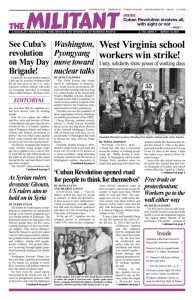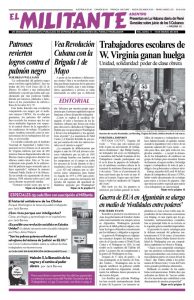HAVANA — In February I learned about “Tocando la luz” — Touching the light — a cinema club for the visually impaired in Cuba. So, while I was here for the Havana International Book Fair, I went to the Infanta Theater and joined 50 sighted and nonsighted participants to see “Café amargo” (Bitter coffee). It’s a 2015 film set in the Sierra Maestra mountains during Cuba’s revolutionary struggle in 1958. It is one of 92 films featuring audio description that have been prepared so far by the Cuban Institute of Cinematographic Art and Industry (ICAIC) in the seven years of the project’s existence.
A joint project of ICAIC and the National Association for the Blind and Visually Impaired (ANCI), the cinema club began in Havana and is now expanding to other provinces.
Audio description is a technique used to describe scenes and visual effects that take place between dialogue without detracting from the artistic experience. In Cuba, rather than listening through special headsets — as is done in theaters in the few capitalist countries where audio described movies are available — sighted and nonsighted moviegoers alike listen to a single movie soundtrack. The added descriptions often have been recorded by well-known actors who perform in Cuba’s radio drama series.
“Everyone is welcome here,” Jorge González Frómeta, the project’s creator, told me. And many come with friends and relatives.
“It’s been a great initiative,” said Marisabel Tamayo, who lost her eyesight when she was 8 years old. “I’ve always loved the movies. I used to go with my mom, she would whisper to me things I couldn’t catch. Now, I don’t have my mom, but I have the cinema club.”
“It allows us to socialize with others, get out of the house,” said 62-year-old Juan Osborne. He became blind in 1984 from a traffic accident. Osborne works as a gardener and rehab technician for the blind. He also performs in the theater group “Sin bastón.” (Without a cane.)
Moviegoers can enjoy an audio described movie once a month, and nine more during the summer, ranging from Cuban film classics to current hits. A list and description of movies scheduled is available in Braille at the theater. Most are Cuban films, but they have also shown some from Argentina, Mexico and Spain. Copyright costs make it prohibitive to include U.S. films in the program. Even if ICAIC could afford the rights, there would be no way to buy them because of the U.S. rulers’ economic embargo against Cuba.
Production of audio description movies is costly, and it’s largely subsidized by the Cuban state. The theater’s take from the showing I saw couldn’t have been more than US$20. Admission is the equivalent of 10 cents, and ANCI members pay half price.
Conquest of Cuba’s revolution
During and after the victory of the Cuban Revolution, with the overthrow of the U.S.-backed Fulgencio Batista dictatorship in 1959, the July 26 Movement and Rebel Army led by Fidel Castro fought to include all working people in running the country and enjoying the fruits of their struggle.
“We have always fought to be included in society,” said Tamayo, describing the gains made by the blind and disabled in access to education and job opportunities. “Before the revolution there was no social inclusion for the blind or for the poor.”
The expansion of access to education and culture for millions of workers and peasants has been at the center of the revolutionary transformations of both the Cuban people themselves and their conditions of life. This got a big boost from the mass literacy campaign in 1961, involving hundreds of thousands of working people in city and countryside. (See article on front page.)
The trade unions and other mass organizations intertwined the literacy campaign with other efforts by workers and farmers to take control of their own destiny — such as land reform and the fight for jobs for all. These efforts laid the groundwork for other popular initiatives, including reopening the national ballet, which Batista had shuttered, and the flowering of libraries, bookstores, art galleries, movie theaters, theater groups, choirs and community cultural centers. And the revolution always strove to include workers with disabilities, as “Touching the light” demonstrates.
Special schools for the blind
In 1959, there was only one special school for the blind, said Tamayo. Now there are 15, one in every province.
“Because we have the reputation of having good hearing skills we were recruited for a special training course, and I ended up working as a piano tuner for 41 years,” she said, explaining that in the 1970s the number of art and music schools grew and there was a shortage of piano tuners. Tamayo was also part of the 1979-83 literacy campaign for those who needed to learn Braille to read and write, one of three organized by the revolutionary government.
Since 2012 ANCI has had a booth at the Havana International Book Fair. Despite the economic difficulties confronting Cuba, the association this year produced 19 books in Braille and two audio books, available free of charge there. And every year the association surveys members about their reading interests to decide what to publish.
In the United States today there is a crisis in Braille literacy, due to government budget cuts and other attacks on public education. Some 40 to 50 percent of blind students don’t finish high school in the U.S., and only 32 percent of the blind have a job.
When I got back to New York I spoke about this experience with Juanita Young, a longtime fighter against police brutality who became visually impaired years ago. She described a summer camp for the visually impaired that she attends. Eighty percent of the movies shown there don’t have audio description, she said, especially the newer films. They say they don’t have the funds. “I’d rather see an old audio described movie 1,000 times over than one where I have no idea what’s happening,” she said.
“Touching the light” has recently expanded to Granma province in the eastern part of the country. “You should not be denied your rights because of where you live,” said project creator Frómeta. “To do this in a small town in Granma is like having a festival.”
And in Cuba there are also national chess and dominoes tournaments, as well as baseball leagues, for the blind.

